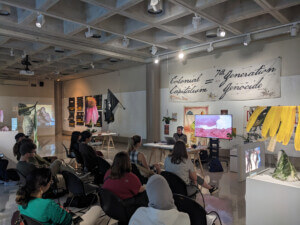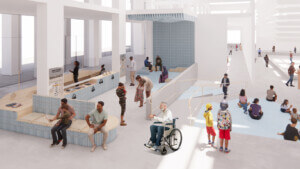Students at the University of California, Berkeley’s College of Environmental Design (CED) will soon be eligible for new full-tuition fellowships geared towards those with an interest in social justice-related work. The school recently announced that it will offer grants to 27 students per year through a four-year pilot program, with funding open to graduate students enrolled in any of the CED’s programs of study.
The so-called Arcus Social Justice Corps (ASJC) fellowship program will be funded through a $5.3 million donation from medical equipment heir Jon Stryker, whose grandfather founded the Stryker Corporation in 1941. In addition to running the Arcus Foundation and donating to causes ranging from great ape conservation to justice for the LGBTQ+ community, Stryker is a trained architect and alumnus of the CED’s Master of Architecture program.
“Their professional fulfillment will have a multiplier effect that will benefit diverse communities large and small by removing financial barriers that often exist to those pursuing social justice careers,” Stryker said of the future recipients of the fellowship.
While applicants for the ASJC will be required to commit to three years of social justice-related work after graduation, Dean Vishaan Chakrabarti of the CED has indicated that the commitment will be nonbinding. As it stands, faculty members estimate that around 80percent of graduating students at the school pursue some sort of socially driven work even without monetary incentives, suggesting that a formalized system of accountability would be unnecessary.
Rather, leaders at the CED intend to ease some of the extreme financial burdens that often face debt-ridden students who proceed down social justice-oriented career paths, particularly in the public and non-profit sectors. Beginning with the inaugural class of fellows this fall, Berkeley also aims to cultivate a community of professionals and mentors for future awardees. According to a description listed on the program’s webpage, “The hope is that Arcus Fellows will return to CED in the years to come to mentor future cohorts of students who want to pursue public service work in the real world, to gain a better understanding of what this means.”
Fellowships for students interested in socially driven careers are relatively commonplace in other professional schools, including medical and law programs at major universities. The Arcus Fellowship, though, provides a unique and rare opportunity for students pursuing design and planning degrees to have their education costs reduced.
With the exploding magnitude of the nationwide student loan debt crisis at the forefront of many educators’ minds, faculty at the CED hope that the ASJC will enable Berkeley, a public university, to compete with comparatively wealthier private institutions for more diverse student bodies. While about 41 percent of the CED’s undergraduates are the first in their families to attend college, the number of underrepresented minority and first-generation students in the school’s graduate programs is substantially lower.
After a year of new statements, policies, and debates addressing issues of justice and equity in architectural education, the ASJC represents just one concrete step that institutions of higher learning can take to render socially-driven design work a more tenable pursuit for graduates.











